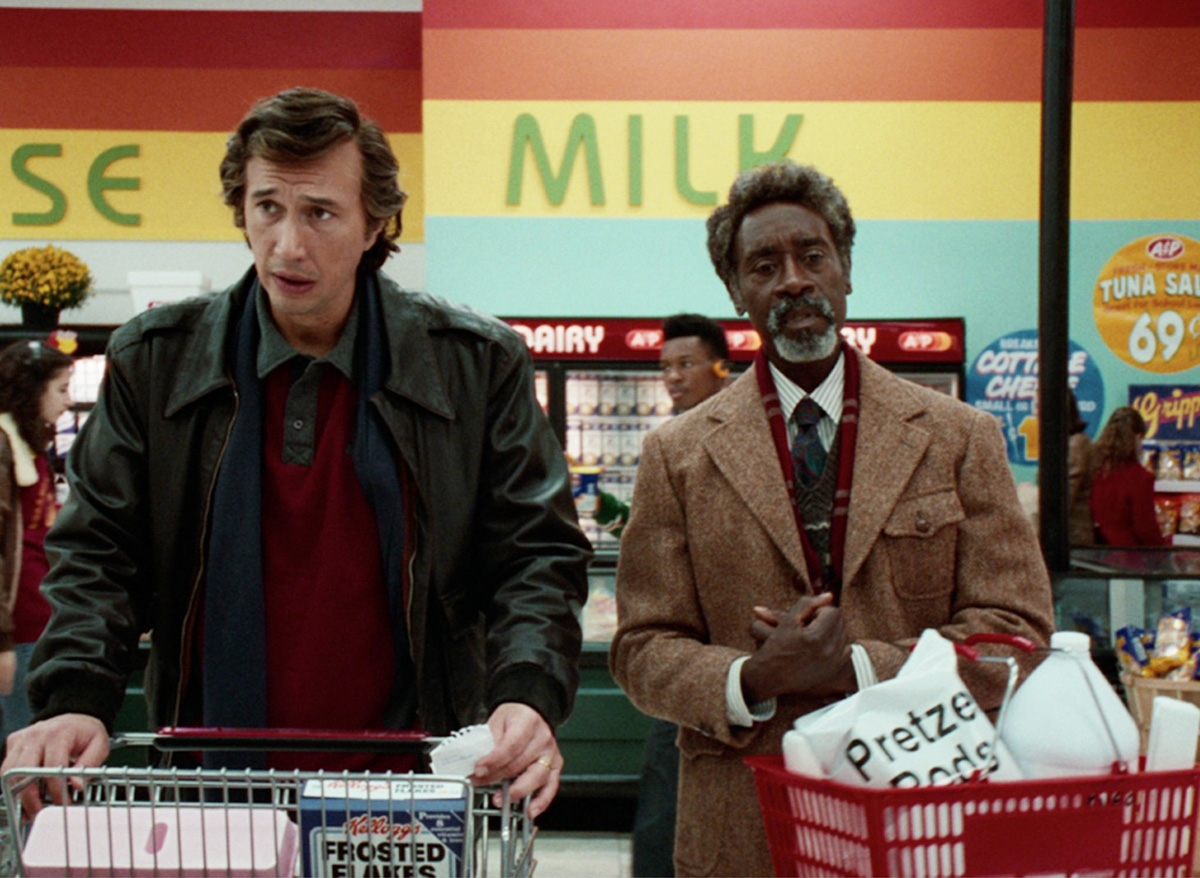The Supermarket in Netflix’s “White Noise” Is Too Unreal To Tolerate

The supermarket is a very special place in White Noise, director Adam Baumbach’s bonkers film adaptation of the celebrated Dom DeLillo novel from 1985, which is now streaming on Netflix.
“This is exciting,” the actor Adam Driver’s character, a professor of “Hitler Studies,” proclaims as he and his family calmly wheel their shopping cart toward the store’s shiny new butcher’s counter. “Coming soon,” the sign says. There, he bumps into a fellow academic, played by Don Cheadle, who is also excited about the new butcher’s counter. “We have one of these in New York,” the other scholar brags.
In some spots, this film feels very relevant to modern life, even for a satire set over three decades ago. Elitist braggadocio, for instance, is timeless.
This supermarket, however, feels like outer space.
For three whole minutes of what seems like endless dialogue, we follow the professor’s family as they stroll down aisles of fully stocked, neatly stacked, beautifully organized, brightly colored boxes, bottles, and cans. Hardly anything looks out of place or disturbed in any way. There is hardly anyone around. The aisles are wide and unobstructed. The vibe is peaceful and relatively quiet. Even the children seem well behaved. The youngest is seen kissing a box of Velveeta Shells & Cheese.
It is, frankly, unlike any visit to the supermarket that you’ve experienced recently.
There are no empty shelves in White Noise. No signs warning, “Limit 2 due to limited supply.” No aisles log-jammed with stressed-out customers pushing oversized carts. No hordes of Amazon and Instacart shoppers jockeying for that last carton of eggs. No gruff security guard inspecting your receipt after checkout.
And oh, the prices! Vivid signage sets the scene. Tomatoes for 48 cents per pound! Strawberries for just 55 cents! Lettuce for 79 cents!
I’m not old enough to remember what grocery shopping was really like back in 1985, but from a contemporary standpoint, this strangely affordable foodie Fantasia comes across as a cruel joke.
Critics have nonetheless heaped lots of praise on the beautiful utopia that Baumbach and his crew created out of an empty Home Depot in suburban Ohio. Thrillist called it “a heavenly body. Its sliding doors might as well be pearly gates.” An interviewer for Awards Watch told production designer Jess Gonchor, “I feel like I could spend this entire conversation asking you about the supermarket. After I saw the movie, I wanted to live in it. It was so beautiful.”
As lovely as it is, the supermarket really has little to do with the film’s plot: an “airborne toxic event” sends the whole town into lockdown and people spend the rest of the movie desperately trying to return to normalcy. In several scenes, the actors are wearing masks, and often wearing them improperly.
That part feels very real right now, three years into the COVID-19 era.
When the story later returns to the supermarket, however, we see no signs whatsoever of the toxic disaster’s impact on regular commerce. No glass shields at the register. No hand sanitizer. Not a single person wearing a mask. Nothing like that.
Nothing has changed. In fact, things are better than ever. The butcher’s counter is now open and doing bang-up business, and we find our two academics again waxing philosophically about how great the whole grocery shopping experience is.
“Everything is fine,” Cheadle’s character says, “and will continue to be fine just as long as the supermarket doesn’t slip.” He goes on, “Do you know the Tibetans believe there is a transitional state between death and rebirth? That’s what I think when I come here. The supermarket is a waiting place. It recharges us spiritually.”
No clue which word best describes how I feel spiritually after slogging my way through a crowded supermarket, but I know that “recharged” isn’t it.
It’s perhaps worth noting that the real supermarket chain that the film version is based on—A&P, once regarded as “the Walmart of its day“—went belly-up in 2015.
By the end of film, the “airborne toxic event” is long gone and people are so happy to be alive that they are literally dancing in the grocery aisles.
Back in the real world, our airborne blight is probably never going away. And the people in the supermarket? We are all praying for a short line to the register and a speedy exit.
As the credits roll and I watch the actors boogie with cereal boxes and mustard bottles to the beat of a brand new song by LCD Soundsystem—which sounds a lot like the band’s old song—I wonder, is this supposed to be heaven or hell?
I can’t tell. But if this is what the afterlife is like, then it’s nothing like real life.









